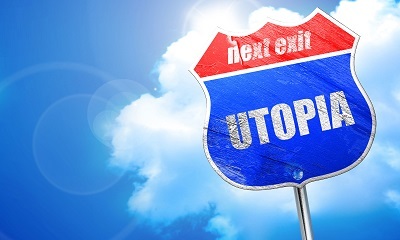February/March 2024: Timeless: Reading Together - Utopia or Dystopia?
Please join us in February/March 2024 for a Timeless Virtual Reading Group with Janet Bufton.

Timeless is our new series of asynchronous reading groups.
Each group will be “open” for a defined time period, with scheduled assigned readings. A discussion leader will offer questions for thought and discussion, and all conversation will occur right here, in the LF Portal.
Our first group, Utopia or Dystopia?, will run from February 26 through Match 1, led by Janet Bufton. The readings are two short stories- one each from Ursula Le Guin and N. K. Jemisin.
Timeless reading groups are open to all members of the LF Portal. We hope you’ll join us for an engaging discussion!
“Science fiction is not predictive. It is descriptive”, says Ursula K. Le Guin in the 1976 introduction to her novel The Left Hand of Darkness.
Ursula K Le Guin’s short story The Ones Who Walk Away from Omelas is a dystopian look at an almost-paradise — glorious Omelas is maintained through the suffering of a child, and by the people who allow that child to suffer.
N.K. Jemisin flips Omelas in The Ones Who Stay and Fight. Um-Helat is another paradise rendered (so the narrator says) believable by a violent truth. Long ago the people of Um-Helat deemed some ideas evil and dangerous. Um-Helat is maintained through the violent containment of those ideas.
The people in Omelas and in Um-Helat are not ignorant, nor do they seem unwilling to take the bargains their cities have struck.
If science fiction is truth-telling through lies, what can these lies teach us?
If you would like to join us, please click here.
Readings:
Ursula K. Le Guin: The Ones Who Walk Away from Omelas, from The Wind’s Twelve Quarters (1975).
N.K. Jemisin: The Ones Who Stay and Fight, from How Long Til Black Future Month (2018).
Questions:
What role do children play in these stories?
Do adults have special obligations to children (as opposed to other adults)?
What are our obligations when we know of injustices? What are our obligations when it comes to the flourishing of others?
How do we measure the cost to some against the benefits to others?
Can societies consent?
What are the limits of societal consent? (How do we know if we’ve achieved “societal consent”?)
What are the limits of individual consent?
Can informed consent mitigate injustice?
How do we view the justice (or injustice) of passivity of those in Omelas as opposed to the activity of the people in Um-Helat?